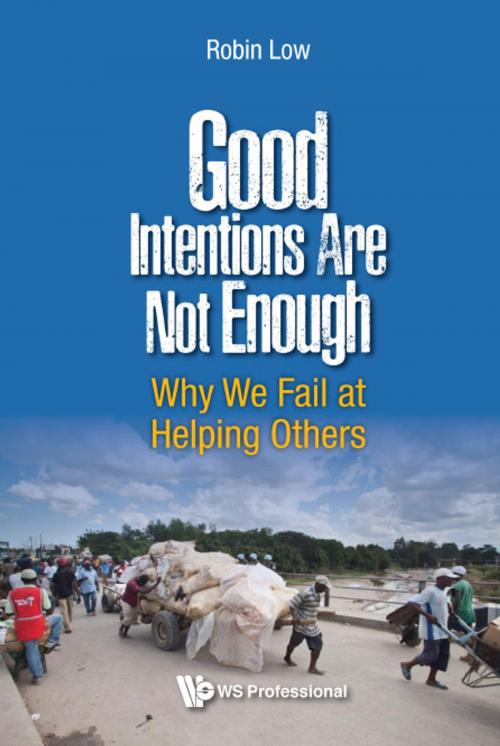Good Intentions Are Not Enough
Why We Fail at Helping Others
Nonfiction, Social & Cultural Studies, Social Science, Volunteer Work, Political Science, Politics, Social Services & Welfare| Author: | Robin Low | ISBN: | 9789813200593 |
| Publisher: | World Scientific Publishing Company | Publication: | October 18, 2016 |
| Imprint: | WS PROFESSIONAL | Language: | English |
| Author: | Robin Low |
| ISBN: | 9789813200593 |
| Publisher: | World Scientific Publishing Company |
| Publication: | October 18, 2016 |
| Imprint: | WS PROFESSIONAL |
| Language: | English |
Disaster strikes, transforming cities and towns into graveyards and wastelands in a matter of minutes. But help is on its way: news channels and social media relay the information to all corners of the globe in real-time, mobilising hundreds of people and organisations to aid. Yet, with standard relief packages regardless of the location, and a lack of effort taken to match volunteers' skills with tasks, just how effective are we at helping others?
Many people want to do good, but they like to do it at their convenience. These attempts at helping often fail, and the blame invariably falls on the disaster victims, rather than looking at the suitability of aid provided. Such help, offered without a thorough understanding of the context or the impact of actions, can create situations that leave the victims worse off than before.
So how can we create real sustainable impact?
Most communities have a lot of unused human capacity. When offering help, many aid providers fail to engage the local communities, thus excluding a critical group of people with the knowledge of local ways and needs.
This book elaborates on a simple principle essential to effective aid — Never Help: Engage, Enable, Empower and Connect.
It is important that we fully understand the problem before we try to solve it, and who better to help us with solutions than the local community?
Contents:
- Introduction
- Shifting Morals and Ethics
- Why We Fail at Helping
- Traveling Overseas to Help? Whom are You Helping?
- Scapegoating
- The Dangers of Social Intervention
- The Curse of Exclusion
- Paradox in the Social Sphere
- The Great Convergence
- Empowering State of Mind
- Having More Social Enterprise is Not Enough
- Case Study 1: Rescued Prostitutes
- Case Study 2: Internet Comes to El Limón
- Case Study 3: The Flower Lady
- The Unequal Distribution of Resources
- Giving Done Wrong
- Free Destroys the Economy
- Good Intentions Fail
- Case Study 4: Sanitation Woes
- Case Study 5: They Ate the Chickens
- Case Study 6: Community Involvement Program Gone Wrong
- Social Technology
- Peace Technology, Social Innovation and Entrepreneurship
- CSR 2.0
- Social Intrapreneur
- Social Business
- Design Thinking and Social Innovation
- Social Community
- Crabs versus Turtles
- Risk versus Innovation
- Never Help, Engage, Enable, Empower & Connect
- Case Study 7: Amazon Disaster Registry
- Case Study 8: Disaster Recovery through Art and Tourism
- Case Study 9: Relief B2B (Business to Business)
- Case Study 10: Relief B2V (Business to Village)
- Case Study 11: Relief Enterprise
- Human-Centric Community Empowerment
- Social Capital
- Circular Economy
- Case Study 12: Prison Entrepreneurship
- Case Study 13: Solar Forward
- Case Study 14: The Sustainability Place of Destiny ("SPOD")
- Jump Start Self-Organizing
- Conscious Consumerism — The Needed Change
- Iteration versus Innovation
- Social Innovation is Not an Easy Task
- Responsibility & Reciprocity
- Conclusion
Readership: Volunteer welfare organisations, charities, foundations, people involved in post-disaster relief, social workers, schools/universities/students interested in volunteer activities.
Key Features:
- Unique approach to examining how effective we are at helping others
- Written by an author with extensive first-hand experience giving aid
- Contains case studies to enhance the readers' understanding
Disaster strikes, transforming cities and towns into graveyards and wastelands in a matter of minutes. But help is on its way: news channels and social media relay the information to all corners of the globe in real-time, mobilising hundreds of people and organisations to aid. Yet, with standard relief packages regardless of the location, and a lack of effort taken to match volunteers' skills with tasks, just how effective are we at helping others?
Many people want to do good, but they like to do it at their convenience. These attempts at helping often fail, and the blame invariably falls on the disaster victims, rather than looking at the suitability of aid provided. Such help, offered without a thorough understanding of the context or the impact of actions, can create situations that leave the victims worse off than before.
So how can we create real sustainable impact?
Most communities have a lot of unused human capacity. When offering help, many aid providers fail to engage the local communities, thus excluding a critical group of people with the knowledge of local ways and needs.
This book elaborates on a simple principle essential to effective aid — Never Help: Engage, Enable, Empower and Connect.
It is important that we fully understand the problem before we try to solve it, and who better to help us with solutions than the local community?
Contents:
- Introduction
- Shifting Morals and Ethics
- Why We Fail at Helping
- Traveling Overseas to Help? Whom are You Helping?
- Scapegoating
- The Dangers of Social Intervention
- The Curse of Exclusion
- Paradox in the Social Sphere
- The Great Convergence
- Empowering State of Mind
- Having More Social Enterprise is Not Enough
- Case Study 1: Rescued Prostitutes
- Case Study 2: Internet Comes to El Limón
- Case Study 3: The Flower Lady
- The Unequal Distribution of Resources
- Giving Done Wrong
- Free Destroys the Economy
- Good Intentions Fail
- Case Study 4: Sanitation Woes
- Case Study 5: They Ate the Chickens
- Case Study 6: Community Involvement Program Gone Wrong
- Social Technology
- Peace Technology, Social Innovation and Entrepreneurship
- CSR 2.0
- Social Intrapreneur
- Social Business
- Design Thinking and Social Innovation
- Social Community
- Crabs versus Turtles
- Risk versus Innovation
- Never Help, Engage, Enable, Empower & Connect
- Case Study 7: Amazon Disaster Registry
- Case Study 8: Disaster Recovery through Art and Tourism
- Case Study 9: Relief B2B (Business to Business)
- Case Study 10: Relief B2V (Business to Village)
- Case Study 11: Relief Enterprise
- Human-Centric Community Empowerment
- Social Capital
- Circular Economy
- Case Study 12: Prison Entrepreneurship
- Case Study 13: Solar Forward
- Case Study 14: The Sustainability Place of Destiny ("SPOD")
- Jump Start Self-Organizing
- Conscious Consumerism — The Needed Change
- Iteration versus Innovation
- Social Innovation is Not an Easy Task
- Responsibility & Reciprocity
- Conclusion
Readership: Volunteer welfare organisations, charities, foundations, people involved in post-disaster relief, social workers, schools/universities/students interested in volunteer activities.
Key Features:
- Unique approach to examining how effective we are at helping others
- Written by an author with extensive first-hand experience giving aid
- Contains case studies to enhance the readers' understanding















